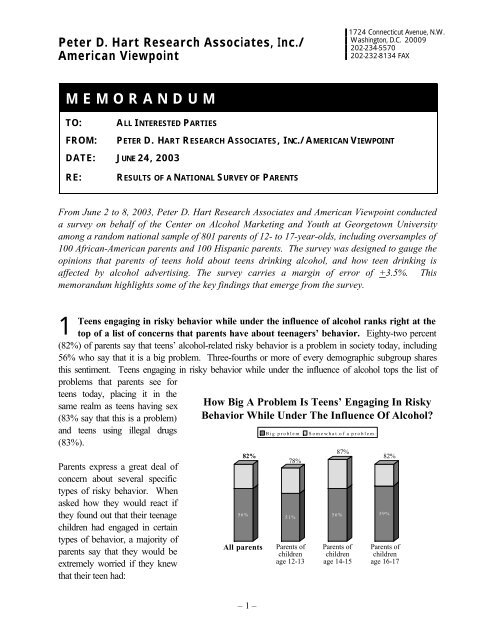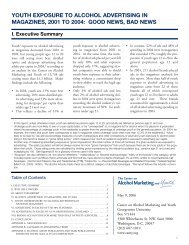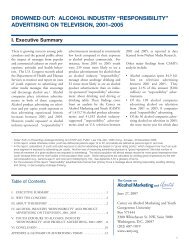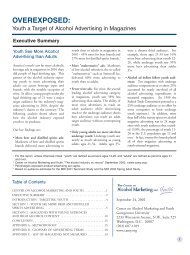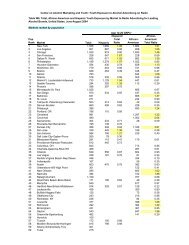M E M O R A N D U M - Center on Alcohol Marketing and Youth
M E M O R A N D U M - Center on Alcohol Marketing and Youth
M E M O R A N D U M - Center on Alcohol Marketing and Youth
You also want an ePaper? Increase the reach of your titles
YUMPU automatically turns print PDFs into web optimized ePapers that Google loves.
Peter D. Hart Research Associates, Inc./<br />
American Viewpoint<br />
1724 C<strong>on</strong>necticut Avenue, N.W.<br />
Washingt<strong>on</strong>, D.C. 20009<br />
202-234-5570<br />
202-232-8134 FAX<br />
M E M O R A N D U M<br />
TO:<br />
FROM:<br />
ALL INTERESTED PARTIES<br />
PETER D. HART RESEARCH ASSOCIATES, INC./AMERICAN VIEWPOINT<br />
DATE: JUNE 24, 2003<br />
RE:<br />
RESULTS OF A NATIONAL SURVEY OF PARENTS<br />
From June 2 to 8, 2003, Peter D. Hart Research Associates <strong>and</strong> American Viewpoint c<strong>on</strong>ducted<br />
a survey <strong>on</strong> behalf of the <str<strong>on</strong>g>Center</str<strong>on</strong>g> <strong>on</strong> <strong>Alcohol</strong> <strong>Marketing</strong> <strong>and</strong> <strong>Youth</strong> at Georgetown University<br />
am<strong>on</strong>g a r<strong>and</strong>om nati<strong>on</strong>al sample of 801 parents of 12- to 17-year-olds, including oversamples of<br />
100 African-American parents <strong>and</strong> 100 Hispanic parents. The survey was designed to gauge the<br />
opini<strong>on</strong>s that parents of teens hold about teens drinking alcohol, <strong>and</strong> how teen drinking is<br />
affected by alcohol advertising. The survey carries a margin of error of +3.5%. This<br />
memor<strong>and</strong>um highlights some of the key findings that emerge from the survey.<br />
1<br />
Teens engaging in risky behavior while under the influence of alcohol ranks right at the<br />
top of a list of c<strong>on</strong>cerns that parents have about teenagers’ behavior. Eighty-two percent<br />
(82%) of parents say that teens’ alcohol-related risky behavior is a problem in society today, including<br />
56% who say that it is a big problem. Three-fourths or more of every demographic subgroup shares<br />
this sentiment. Teens engaging in risky behavior while under the influence of alcohol tops the list of<br />
problems that parents see for<br />
teens today, placing it in the<br />
same realm as teens having sex<br />
(83% say that this is a problem)<br />
<strong>and</strong> teens using illegal drugs<br />
(83%).<br />
Parents express a great deal of<br />
c<strong>on</strong>cern about several specific<br />
types of risky behavior. When<br />
asked how they would react if<br />
they found out that their teenage<br />
children had engaged in certain<br />
types of behavior, a majority of<br />
parents say that they would be<br />
extremely worried if they knew<br />
that their teen had:<br />
How Big A Problem Is Teens’ Engaging In Risky<br />
Behavior While Under The Influence Of <strong>Alcohol</strong><br />
82%<br />
56%<br />
All parents<br />
Big problem<br />
78%<br />
51%<br />
Parents of<br />
children<br />
age 12-13<br />
Somewhat of a problem<br />
87%<br />
56% 59%<br />
Parents of<br />
children<br />
age 14-15<br />
82%<br />
Parents of<br />
children<br />
age 16-17<br />
– 1 –
Peter D. Hart Research Associates, Inc./American Viewpoint<br />
‣ Ridden in a car with a driver who has been drinking alcohol: 74%<br />
‣ Been drunk or very high from drinking alcoholic beverages: 70%<br />
‣ Smoked marijuana: 68%<br />
‣ Had sexual intercourse: 65%<br />
A majority of parents also say that they would be extremely or very worried if they found out that their<br />
teen had been to a party where there was underage drinking (70%) or if their teen had c<strong>on</strong>sumed an<br />
alcoholic beverage (69%).<br />
2<br />
Although parents say that they would be worried if they found out that their teens had<br />
engaged in these behaviors, most do not think that their teens actually have d<strong>on</strong>e these<br />
things in the past 12 m<strong>on</strong>ths. Sixteen percent (16%) of parents c<strong>on</strong>firm that their teen definitely or<br />
probably has ridden in a car with some<strong>on</strong>e who has been drinking, 10% believe that their teen definitely<br />
or probably has been drunk, <strong>and</strong> 25% think their teen definitely or probably has c<strong>on</strong>sumed an alcoholic<br />
beverage. One in three parents say that their teen definitely or probably has d<strong>on</strong>e at least <strong>on</strong>e of these<br />
things. Parents of older teens are more likely than are parents of younger teens to say that their children<br />
have c<strong>on</strong>sumed an alcoholic beverage or been drunk. It is interesting to note, however, that a wide gap<br />
exists between parents’ percepti<strong>on</strong>s of their teens’ drinking habits <strong>and</strong> those habits as reported by teens<br />
themselves.<br />
PARENTS’ PERCEPTIONS OF TEEN DRINKING VERSUS<br />
TEENS’ REPORTING OF SAME<br />
Teen has c<strong>on</strong>sumed an<br />
alcoholic beverage<br />
Parents Of<br />
%<br />
Teens 1<br />
%<br />
“Percepti<strong>on</strong> Gap”<br />
%<br />
13- to 14-year-olds 12 39 27<br />
15- to 16-year-olds 31 60 29<br />
Teen has been drunk or very high<br />
from drinking alcoholic beverages<br />
13- to 14-year-olds 5 15 10<br />
15- to 16-year-olds 10 35 25<br />
1<br />
SOURCE: The M<strong>on</strong>itoring the Future Survey, the University of Michigan, 2002,<br />
http://m<strong>on</strong>itoringthefuture.org. The data shown are reported as being am<strong>on</strong>g 8 th graders <strong>and</strong> 10 th graders,<br />
respectively.<br />
– 2 –
Peter D. Hart Research Associates, Inc./American Viewpoint<br />
As illustrated in the previous table, a double-digit percepti<strong>on</strong> gap exists between parents <strong>and</strong> teens in<br />
every age range. When it comes to c<strong>on</strong>sumpti<strong>on</strong> of an alcoholic beverage, the largest gap is between<br />
15- to 16-year-olds <strong>and</strong> their parents. Only 31% of parents of teens in this age group say that their<br />
teen definitely or probably has c<strong>on</strong>sumed an alcoholic beverage, as compared with 60% of teens who<br />
report having d<strong>on</strong>e this, a 29-point difference. When it comes to teens having been drunk, the largest<br />
gap is again between teens 15- to 16-years-old <strong>and</strong> their parents. In this case, 10% of parents believe<br />
that their teen has been drunk, versus 35% of 15- to 16-year-olds who report having been drunk,<br />
reflecting a 25-point difference.<br />
3<br />
After being exposed to a number of facts about teens <strong>and</strong> alcohol, three-fourths of<br />
parents say that teen alcohol c<strong>on</strong>sumpti<strong>on</strong> is a big problem in our society today. In the<br />
survey, parents are read seven facts related to teens <strong>and</strong> alcohol c<strong>on</strong>sumpti<strong>on</strong>, including “alcohol plays a<br />
substantial role in the three leading causes of death am<strong>on</strong>g teens” <strong>and</strong> “as much as 20% of the beer,<br />
wine, <strong>and</strong> hard liquor sold in the United States each year is c<strong>on</strong>sumed by people under age 21” (for a<br />
full listing of facts, please see attached topline document). Fifty-nine percent (59%) of parents say that<br />
they are very c<strong>on</strong>cerned by each <strong>and</strong> every <strong>on</strong>e of the facts listed.<br />
After hearing all the facts about teens <strong>and</strong> alcohol, 77% of parents say that teen alcohol<br />
c<strong>on</strong>sumpti<strong>on</strong> is a big problem in our society today. Although this view is held by large majorities of<br />
every demographic subgroup, slight differences exist again in resp<strong>on</strong>ses based up<strong>on</strong> the age of the child<br />
in questi<strong>on</strong>.<br />
Proporti<strong>on</strong>s Who Say Teen <strong>Alcohol</strong><br />
C<strong>on</strong>sumpti<strong>on</strong> Is A Big Problem Today<br />
77%<br />
71%<br />
76%<br />
81%<br />
All parents<br />
Parents of<br />
children<br />
age 12-13<br />
Parents of<br />
children<br />
age 14-15<br />
Parents of<br />
children<br />
age 16-17<br />
4<br />
Parents perceive alcohol ads as having a serious effect <strong>on</strong> teen drinking habits, <strong>and</strong> they<br />
see alcohol companies as falling far short in dealing resp<strong>on</strong>sibly with the impact of their<br />
advertising <strong>on</strong> young people. Fully two-thirds of parents say that seeing <strong>and</strong> hearing alcohol ads<br />
makes teens more likely to drink alcohol than they otherwise would be. This result is uniform am<strong>on</strong>g<br />
– 3 –
Peter D. Hart Research Associates, Inc./American Viewpoint<br />
parents of teens in every age range. One in five (21%) parents say that seeing <strong>and</strong> hearing alcohol ads<br />
does not have any effect <strong>on</strong> teen drinking, <strong>and</strong> <strong>on</strong>ly 5% say that these ads make teens less likely to<br />
drink. It is important to note that minority parents are substantially more likely than are parents overall<br />
to think that watching <strong>and</strong> hearing alcohol ads makes teens more likely to drink, with 76% of African-<br />
American parents <strong>and</strong> 73% of Hispanic parents saying that this is the case.<br />
Proporti<strong>on</strong>s Who Believe Seeing/Hearing Ads<br />
For <strong>Alcohol</strong> Products Makes Teens More Likely<br />
To Drink <strong>Alcohol</strong> Than They Would Be Otherwise<br />
66% 67%<br />
64%<br />
67%<br />
All parents<br />
Parents of<br />
children<br />
age 12-13<br />
Parents of<br />
children<br />
age 14-15<br />
Parents of<br />
children<br />
age 16-17<br />
Given the influence that parents perceive alcohol ads as having <strong>on</strong> teens, it is significant that parents do<br />
not believe that alcohol companies are doing everything they can or should be doing to limit teens’<br />
exposure to these ads. Nearly three in four (71%) parents say that alcohol companies are not doing<br />
enough to limit the amount of alcohol ads that teens see, <strong>and</strong> 62% say that alcohol companies definitely<br />
(39%) or probably (23%) target their advertising to people under age 21. Again, majorities of parents<br />
of teens in all age ranges agree with this latter sentiment, with 57% of parents of 12- to 13-year-olds<br />
saying that alcohol companies target teens <strong>and</strong> 64% of parents of 14- to 17-year-olds saying that this is<br />
the case.<br />
5<br />
Overall, parents find alcohol companies’ specific advertising practices to be very<br />
troubling. Parents were read a list of facts about alcohol advertising <strong>and</strong> young people <strong>and</strong> asked<br />
for their reacti<strong>on</strong> to each practice. A majority of parents find each individual practice to be very<br />
troubling, <strong>and</strong> 35% find every practice to be very troubling. The facts that the largest percentages of<br />
parents c<strong>on</strong>sider to be very troubling are listed below (for a full listing of facts, please see attached<br />
topline document).<br />
‣ <strong>Alcohol</strong> companies produce marketing Web sites that include video games <strong>and</strong> other features<br />
that appeal to young people who are under the legal drinking age: 65%<br />
– 4 –
Peter D. Hart Research Associates, Inc./American Viewpoint<br />
‣ African-American youths are exposed to more alcohol advertising than are other youths. For<br />
example, alcohol advertising was placed <strong>on</strong> all 15 televisi<strong>on</strong> programs most popular am<strong>on</strong>g<br />
African-American youths, <strong>and</strong> young African Americans were exposed to significantly more<br />
radio <strong>and</strong> magazine advertising than were other youths: 63% (75% of African-American<br />
parents)<br />
‣ Beer companies place their advertisements <strong>on</strong> televisi<strong>on</strong> in such a way that young people age 12<br />
to 20 see two beer advertisements <strong>on</strong> televisi<strong>on</strong> for every three seen by an adult: 63%<br />
‣ Hispanic youths are exposed to more alcohol advertising than are other youths. For example,<br />
alcohol advertising was placed <strong>on</strong> 12 of the 15 televisi<strong>on</strong> programs most popular am<strong>on</strong>g<br />
Hispanic youths, <strong>and</strong> young Hispanics were exposed to more radio <strong>and</strong> magazine advertising<br />
than were other youths: 62% (68% of Hispanic parents)<br />
‣ Beer companies choose to advertise <strong>on</strong> televisi<strong>on</strong> networks such as the WB, Comedy Central,<br />
BET, <strong>and</strong> VH-1, where youths are more likely to see the ads than are adults: 62%<br />
‣ Magazines that are popular am<strong>on</strong>g youths, such as Sports Illustrated, Rolling St<strong>on</strong>e, Allure,<br />
Vibe, <strong>and</strong> Spin frequently have ads for alcoholic beverages. In 2001, most 12- to 20-year-olds<br />
saw an average of 165 alcohol ads in magazines. During that same year, most adults over 21<br />
saw an average of <strong>on</strong>ly 133 ads: 61%<br />
After hearing these <strong>and</strong> other advertising practices used by alcohol companies, fully 78% of parents say<br />
that they disapprove of alcohol companies’ advertising practices, including 52% who str<strong>on</strong>gly<br />
disapprove. When asked why they disapprove of alcohol companies’ advertising practices, <strong>on</strong>e in three<br />
(31%) parents volunteer that they believe that alcohol companies are targeting children.<br />
6<br />
Parents overwhelmingly reject the argument that alcohol companies’ advertising<br />
practices are legitimate as they are <strong>on</strong>ly trying to make m<strong>on</strong>ey like any other business.<br />
Rather, parents believe that, due to the potentially harmful effects of its products, the alcohol<br />
industry has a special resp<strong>on</strong>sibility to avoid exposing its products to young people. Parents<br />
were read the following two statements about alcohol companies’ advertising <strong>on</strong> televisi<strong>on</strong>, <strong>and</strong> were<br />
asked which comes closer to their own point of view:<br />
Some people say that the alcohol industry is trying to make m<strong>on</strong>ey like any other business<br />
<strong>and</strong> that its televisi<strong>on</strong> advertising <strong>on</strong> programs with large youth audiences is a perfectly<br />
legitimate way for it to market its products.<br />
Some people say that, unlike other businesses that advertise <strong>on</strong> televisi<strong>on</strong>, the alcohol<br />
industry has a special resp<strong>on</strong>sibility because of the potentially damaging effects of its<br />
products <strong>and</strong> should take steps to avoid exposing young people to messages encouraging<br />
alcohol c<strong>on</strong>sumpti<strong>on</strong>.<br />
By a 67-percentage-point margin, parents favor the sec<strong>on</strong>d statement over the first (81% to 14%).<br />
This preference is equally likely to be held by parents of teens in each age group, as well as by<br />
majorities of Democrats, independents, <strong>and</strong> Republicans.<br />
– 5 –
Peter D. Hart Research Associates, Inc./American Viewpoint<br />
Parents’ Views of Televisi<strong>on</strong> Advertising by<br />
the <strong>Alcohol</strong>ic Beverage Industry<br />
Special<br />
Resp<strong>on</strong>sibility<br />
%<br />
Legitimate Way<br />
To Advertise<br />
%<br />
All parents 81 14<br />
Parents of 12- to 13-year-olds 84 12<br />
Parents of 14- to 15-year-olds 81 14<br />
Parents of 16- to 17-year-olds 80 14<br />
Democrats 84 12<br />
Independents 82 13<br />
Republicans 78 16<br />
Although many parents are not aware of the extent of teenage drinking, there is no questi<strong>on</strong> that parents<br />
are extremely c<strong>on</strong>cerned about the problem of teens drinking alcoholic beverages. In additi<strong>on</strong> to<br />
believing that teens’ risky behavior while under the influence of alcohol is a problem for society as a<br />
whole, they say that they would be extremely worried if they found out that their own teen is drinking<br />
alcohol. Moreover, while a few parents say that it is their resp<strong>on</strong>sibility to make sure that their teens are<br />
not drinking alcohol, the vast majority say that alcohol companies should be doing more to limit the<br />
amount of alcohol advertising that teens see. These sentiments are virtually universal, crossing gender,<br />
age, racial, <strong>and</strong> political lines.<br />
– 6 –


